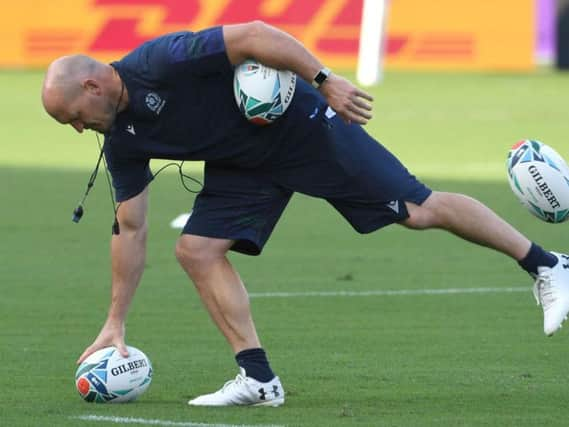Allan Massie: Only surprising thing about Gregor Townsend's team is that there are no surprises


In one respect our history is curious: we have never lost a match we were expected to win or won one we were expected to lose.
Given that Ireland are currently ranked number one in the world and that perhaps 90 per cent of rugby followers worldwide – and a fair number here in Scotland – expect an Irish victory tomorrow, the odds are that this pattern won’t be disturbed. Moreover, rain is forecast and this may be thought to favour Ireland’s game, so often based on kicking and ”one pass and take the tackle” rugby.
Advertisement
Hide AdAdvertisement
Hide AdIreland won at Murrayfield in the Six Nations, a match in which Scotland were disrupted by a first-half injury to Stuart Hogg and one which we had opportunities to win. That has too often been Scotland’s story. Ireland won in Dublin last year too, and have had the better of us for most of the last twenty years. Nevertheless an impartial observer – if such a person is to be found – might remark that there is little to choose between the two sides, adding only that Ireland have a better record of winning close matches.
That said, there are some doubts about Ireland now, and not only because England thumped them in a warm-up match.
We can’t be unhappy to see them lining up without Rob Kearney, Keith Earls and Robbie Henshaw in the back division. The replacements , Andrew Conway, Jordan Larmour and Bundee Aki, are all very good players.
Nevertheless, if conditions are indeed wet, there is nobody in World Rugby more secure under the high ball than Kearney, and we know to our cost that Keith Earls is a wonderful poacher, adept at finding a way through heavy traffic to the try-line.
The only surprising thing about Gregor Townsend’s selection is that there are no real surprises. Some of us might have opted for Darcy Graham on the right wing, partly because he is in try-scoring form, partly because he tackles in the classical low style, and that sort of tackle is the best way of stopping the dangerous Jacob Stockdale, but Tommy Seymour has vast experience and has seldom let Scotland down.
Townsend’s loyalty to him is understandable. Again, there was a case with fielding Blade Thomson at 8 as a very powerful ball-carrier, but Townsend has always valued Ryan Wilson for his intense competitiveness and reading of the game , first for Glasgow and then for Scotland. In any case one would expect both Graham and Thomson to feature later in the game.
This is a very experienced Scotland team. Only Sam Johnson at inside centre has fewer than twenty caps. Moreover it is, I think, the first match in his two years as coach that injuries haven’t prevented Townsend from fielding his preferred XV. After an injury-ravaged Spring we have our best team on the field.
Nobody has ever gone far in the World Cup with a team richer in youthful promise than in experience. At the same time only Greig Laidlaw and John Barclay in this XV may be approaching the end of their international career.
Advertisement
Hide AdAdvertisement
Hide AdI’m a great admirer of both Ali Price and George Horne, but I never had any doubt that Laidlaw would start on Sunday. He is of course our best goal-kicker, and this is important, but he is also our best game-manager. His critics – all scrum-halves have critics – will tell you he too often slows up the game.
The truth is that when he gets clean quick ball he moves it on fast; anyone who has watched him play for Clermont-Auvergne knows that –they’re a team that thrives on quick ball.
What he doesn’t do is ship slow ball on to his backs, especially when they are confronted with a rush defence like Ireland’s. Instead he holds it until supporting forwards are in place and a new attack can be set up. He is as canny and clever as can be, and we need his sort of player.
We have too often started badly, never more so than at Twickenham in March when Jack Nowell scored for England when he game was only a minute old. Twickenham came close to being a disaster, one of our worst-ever ones, with England 31-0 up after a mere half-hour. But this Scotland team is astonishingly resilient and nobody will ever forget that magical second half orchestrated by Finn Russell in peerless form.
Still we can’t afford to start like that again, and we can be sure that Ireland will be well aware of our tendency to start badly. It must be a mental thing. We need to start tomorrow as Scotland did in the 1990 Grand Slam match when the forwards, especially Finlay Calder, took the game by the scruff of the neck. If Stuart McInally wins the toss, he should surely choose to kick off – and for the kicker not to direct his kick to C J Stander. Better to put it high under the posts and see what happens.
• Our Japan 2019 Rugby World Cup coverage is brought to you in association with Castle Water and on Twitter @CastleWaterLtd